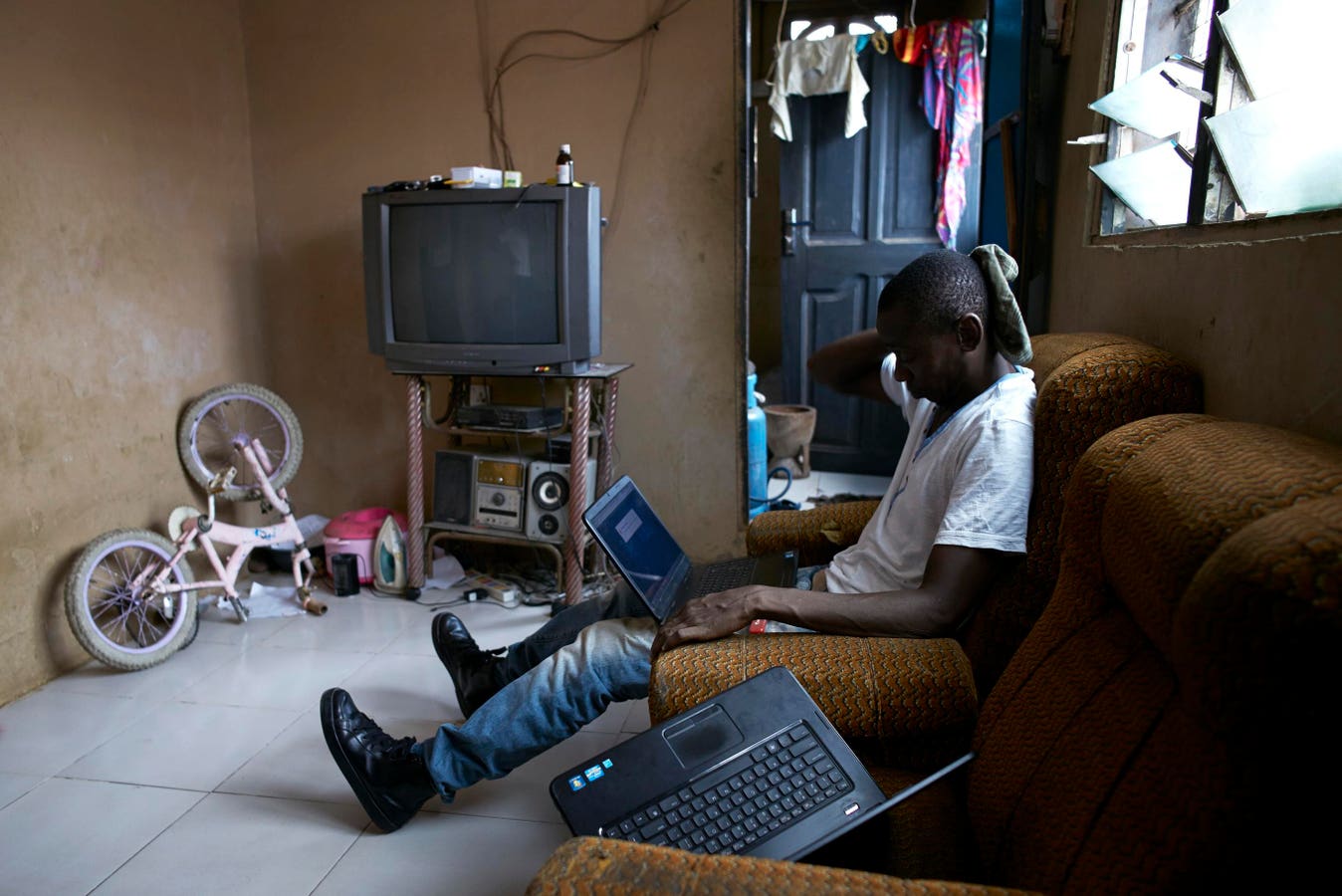A romance fraudster who goes by “Ghost,” in Accra, Ghana.
getty
In 2019, Sarah, who works for a charity in California, began using a religious dating website that had been recommended by friends and family. Early on, men she connected with would ask her for money. So she stayed wary. She would use reverse image search to look up people’s photos, for instance, and try to figure out if they were who they said they were.
Sarah aimed to take things slow with David, a gold dealer in California, who she matched with in January 2023. She stayed on her guard through several weeks of messages, which they eventually moved to the messaging-app Telegram, at his suggestion.
In February, when they had a video chat, she was relieved to find that “he looked like his picture.” He resembled a young Will Smith, who Sarah had had a crush on, years before. He said that his mom was Brazilian, and shared photos of her in a nursing home.
David was kind and considerate, frequently messaging Sarah to ask her how she’d slept and how she’d eaten. He was interested in so many small details of her life, though he was somewhat private about his own. He showered her with affection and compliments. “You’re the sweetest woman I’ve ever met,” he told her in February.
Though their schedules kept getting in the way of them meeting in person, David started talking about marriage. Sarah began falling for him. It helped that he, like her, was deeply religious.
In March, in one of his daily messages, David mentioned that he was stranded on a work trip and couldn’t access his bank account. He asked for her help. Sarah refused to send him money; it reminded her of the scammers she had previously met online.
After some harsh words and a difficult night, Sarah came around the next morning. She ended up sending $250 to a Zelle account in another person’s name, to help David get home.
That was just the start. David would go on to report a series of financial and personal hardships, from his cards being blocked to a lawsuit against him to his mother falling ill. David asked Sarah to transfer the money via Zelle, PayPal, gift cards, and eventually bitcoin. He would barrage her with messages sweet-talking or guilt-tripping her into helping him again just this one time, often with such urgency that she had little time to consider. Sometimes he would invoke her duty as a Christian. But he kept repeating that he would pay her back once his run of bad luck ended, and when they would finally be able to meet in person. He sent her documents—his driver’s license, bank statements, and legal papers—to reassure her that he was legitimate.
As Sarah’s savings diminished, her anxiety mounted. Already exhausted from working multiple jobs, the situation started to affect her sleep. In July, she ran out of money to pay her rent. She started to lean on one credit card, then another. She had to borrow money from her parents, then take out a loan. At some point Sarah continued messaging David mainly in the hopes of getting her money back; each additional transfer just felt like a drop in the bucket of the amount he owed her overall. “The only reason I keep doing this is because I am so deep in debt I feel like I have no other choice,” she wrote in November 2023.
That month, Sarah had had enough. She realized it was never going to end, and cut off contact. All told, she’s lost about $100,000. Yet David has continued contacting her from new numbers, which keeps extending the pain. “For a while it broke me,” she reflects. At her lowest point, she considered suicide.
A part of her had recognized early on that David was a fraudster. She’d written in June, “What’s really sad is that in the beginning I started to care about you. I envisioned a possible future together. I know you never cared for me. You sensed I was vulnerable and preyed upon that to get money. I knew this awhile ago but didn’t want to admit it.”
This is a good encapsulation of how online romance fraud works. In order to combat this type of crime, we need to understand who is behind it, emphasizes Suleman Lazarus, a criminologist at the London School of Economics and Political Science. “Victims and perpetrators are like two sides of the same coin. You cannot talk about one without the other,” he says.
So, what kind of person might David be?
Why Romance Fraud Has Taken Off In West Africa
According to an analysis by Andrea Mojedano Batel, a research fellow at the Aston Institute for Forensic Linguistics, the conversations between Sarah and David suggest that he, or the people presenting themselves as “David,” may hail from West Africa. For instance, he referred to his “pains” rather than “pain,” which might indicate influence from a language that pluralizes such words. According to Mojedano Batel, “this kind of construction is typical in translations from African languages, particularly West African English-influenced varieties” such as Nigerian, Ghanaian, or Cameroonian English. Similarly, talking of “God’s promise” in reference to an ideal future is common in Nigeria and other parts of Anglophone West Africa. The accounts where Sarah sent money at David’s direction were linked to multiple countries, including Nigeria.
Getting to the perpetrators can be challenging work. Lazarus uses multiple SIM cards when conducting his research, and is generally careful about his digital security. He and a colleague from Nigeria’s Economic and Financial Crimes Commission (EFCC) have studied 80 case files of romance fraudsters to better understand how they work. Because online romance fraud is so common, enforcement agencies simply don’t have the resources to pursue every case. In Nigeria, Lazarus says, the EFCC prioritizes the likelihood of a successful prosecution.
Part of what makes these crimes difficult to prosecute is the web of people involved. “Sometimes online romance fraud doesn’t just involve the victim and the perpetrator,” Lazarus says. “Sometimes it involves multiple criminals coordinating an attack on one individual.” This could include people spread across multiple countries, providing information about a target’s neighborhood to make the fake persona more convincing, or transferring money between accounts so that it becomes impossible to trace.
Motivations are both individual and societal. Given the widespread unemployment and financial precarity in Nigeria, cyberfraud can seem like an appealing way—sometimes the only way—to earn a living. There’s a whole infrastructure behind the fraud economy in Nigeria. At scamming schools (sometimes called “hustle kingdoms”), experienced fraudsters school up-and-comers in grooming techniques. Criminal networks also maintain and sometimes sell spreadsheets of targets, which can lead to the same person being victimized over and over again, by fraudsters taking on new personas.
Although even a Nigerian politician has been arrested for carrying out romance fraud, typically an online romance fraudster is someone relatively early to a fraud career, according to Lazarus. This type of crime takes a big time investment (one fraudster might be grooming up to 50 targets at a time), and an individual victim’s wealth is limited compared to an organization’s. So it can be a kind of entry point into fraud work, or a part-time activity. Families often support this trade, Lazarus reports. Mothers may encourage their sons; wives and girlfriends may see it as a way to keep the children fed.
West African fraudsters also represent their work as a kind of redress for historical injustice. Whether they’re defrauding white and light-skinned people in Europe, the Middle East, or North America, they refer to the “colonialism” of the slave trade, imperialism, and other legacies of inequality.
Fraudsters are good at leveraging the characteristics of their victims, Lazarus says. Religion might not be a key reason to target someone, but pleading for forgiveness and kindness can be a way to groom religious targets. The key factor is apparent financial security. Kweiku, a Ghanaian romance fraudster, told ABC News in Australia, “Sometimes you will be talking to the person and you can even feel pity for that person…We feel pity, but you too, you need money.”
Earlier this month, U.S. attorneys unsealed a two-year-old indictment charging four Ghanaian men with money laundering, wire fraud, and related crimes. Their network is accused of carrying out romance fraud and email-based cyberfraud, amounting to over $100 million and involving dozens of victims. Following a manhunt, three of the men have now been extradited from Ghana to the U.S. Ghanaian media have reported that one owns a soccer academy and another is a charismatic entrepreneur. However, rank-and-file Ghanaian romance fraudsters typically lack formal jobs. Kweiku, who has defrauded lonely people including a Mexican widow in the U.S., sells perfume on the street in Ghana.
The now-public indictment alleges, “Members of the Enterprise referred to their fraudulent activity as “sakawa,” a Ghanaian term that refers to internet fraud. In general, members of the Enterprise known as “sakawa boys” or “game boys” conducted the online fraudulent activity and directed their victims to transfer money to middlemen in the United States…The middlemen would take a percentage of the funds and launder the rest of the money to other members of the Enterprise located in West Africa.”
Trying To Move Forward
David drained Sarah’s savings, ruined her financially, and shattered her trust in other people. Now, she says, “I don’t trust people very much. I am never going to loan money to anybody literally outside of my immediate family. I’m very suspicious of people.” She’s stopped dating. The experience also affected her self-perception. She’s told almost no one about David, as she worried that they would consider her foolish. But her faith has helped her to forgive both David and herself.
She’s reported David’s account to the dating website where they met, filed a complaint with the National Consumers League, and contacted the local police. But because there are so many perpetrators of this type of fraud, and the money is long gone, there’s little recourse for Sarah now.
But she hopes that others can avoid her experiences. Given the international nature of this type of crime, international cooperation is necessary. “They need to have more people on this,” she emphasizes of the U.S. government. Lazarus believes that while the FBI’s presence in West Africa has dampened some fraud groups, like the group recently extradited from Ghana, the U.S. government’s recent moves to reduce operations in Africa could help cybercriminals to operate more freely.
Sarah still says, “I want to trust people. I do believe people are good deep down.”
This is the first in a series of articles on transnational romance fraud.









